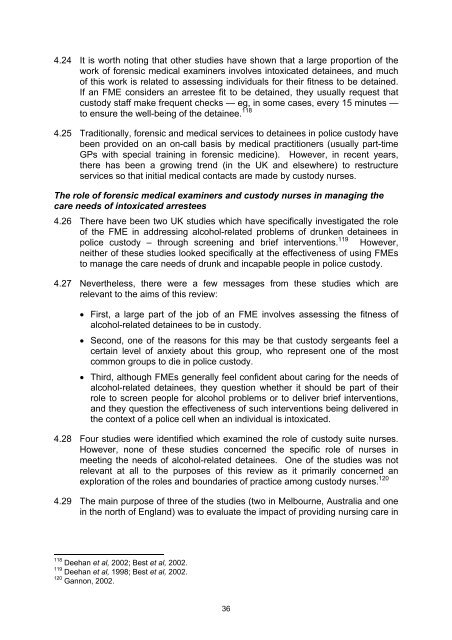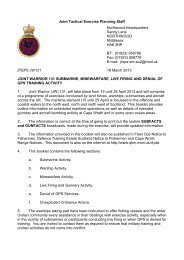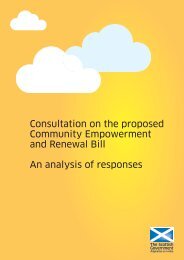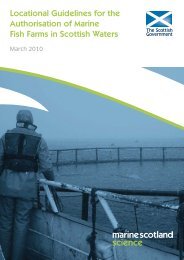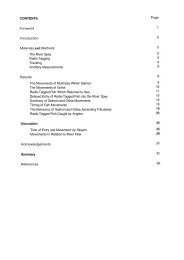Services that Manage the Care Needs of Drunk - Scottish Government
Services that Manage the Care Needs of Drunk - Scottish Government
Services that Manage the Care Needs of Drunk - Scottish Government
Create successful ePaper yourself
Turn your PDF publications into a flip-book with our unique Google optimized e-Paper software.
4.24 It is worth noting <strong>that</strong> o<strong>the</strong>r studies have shown <strong>that</strong> a large proportion <strong>of</strong> <strong>the</strong><br />
work <strong>of</strong> forensic medical examiners involves intoxicated detainees, and much<br />
<strong>of</strong> this work is related to assessing individuals for <strong>the</strong>ir fitness to be detained.<br />
If an FME considers an arrestee fit to be detained, <strong>the</strong>y usually request <strong>that</strong><br />
custody staff make frequent checks — eg, in some cases, every 15 minutes —<br />
to ensure <strong>the</strong> well-being <strong>of</strong> <strong>the</strong> detainee. 118<br />
4.25 Traditionally, forensic and medical services to detainees in police custody have<br />
been provided on an on-call basis by medical practitioners (usually part-time<br />
GPs with special training in forensic medicine). However, in recent years,<br />
<strong>the</strong>re has been a growing trend (in <strong>the</strong> UK and elsewhere) to restructure<br />
services so <strong>that</strong> initial medical contacts are made by custody nurses.<br />
The role <strong>of</strong> forensic medical examiners and custody nurses in managing <strong>the</strong><br />
care needs <strong>of</strong> intoxicated arrestees<br />
4.26 There have been two UK studies which have specifically investigated <strong>the</strong> role<br />
<strong>of</strong> <strong>the</strong> FME in addressing alcohol-related problems <strong>of</strong> drunken detainees in<br />
police custody – through screening and brief interventions. 119 However,<br />
nei<strong>the</strong>r <strong>of</strong> <strong>the</strong>se studies looked specifically at <strong>the</strong> effectiveness <strong>of</strong> using FMEs<br />
to manage <strong>the</strong> care needs <strong>of</strong> drunk and incapable people in police custody.<br />
4.27 Never<strong>the</strong>less, <strong>the</strong>re were a few messages from <strong>the</strong>se studies which are<br />
relevant to <strong>the</strong> aims <strong>of</strong> this review:<br />
• First, a large part <strong>of</strong> <strong>the</strong> job <strong>of</strong> an FME involves assessing <strong>the</strong> fitness <strong>of</strong><br />
alcohol-related detainees to be in custody.<br />
• Second, one <strong>of</strong> <strong>the</strong> reasons for this may be <strong>that</strong> custody sergeants feel a<br />
certain level <strong>of</strong> anxiety about this group, who represent one <strong>of</strong> <strong>the</strong> most<br />
common groups to die in police custody.<br />
• Third, although FMEs generally feel confident about caring for <strong>the</strong> needs <strong>of</strong><br />
alcohol-related detainees, <strong>the</strong>y question whe<strong>the</strong>r it should be part <strong>of</strong> <strong>the</strong>ir<br />
role to screen people for alcohol problems or to deliver brief interventions,<br />
and <strong>the</strong>y question <strong>the</strong> effectiveness <strong>of</strong> such interventions being delivered in<br />
<strong>the</strong> context <strong>of</strong> a police cell when an individual is intoxicated.<br />
4.28 Four studies were identified which examined <strong>the</strong> role <strong>of</strong> custody suite nurses.<br />
However, none <strong>of</strong> <strong>the</strong>se studies concerned <strong>the</strong> specific role <strong>of</strong> nurses in<br />
meeting <strong>the</strong> needs <strong>of</strong> alcohol-related detainees. One <strong>of</strong> <strong>the</strong> studies was not<br />
relevant at all to <strong>the</strong> purposes <strong>of</strong> this review as it primarily concerned an<br />
exploration <strong>of</strong> <strong>the</strong> roles and boundaries <strong>of</strong> practice among custody nurses. 120<br />
4.29 The main purpose <strong>of</strong> three <strong>of</strong> <strong>the</strong> studies (two in Melbourne, Australia and one<br />
in <strong>the</strong> north <strong>of</strong> England) was to evaluate <strong>the</strong> impact <strong>of</strong> providing nursing care in<br />
118<br />
Deehan et al, 2002; Best et al, 2002.<br />
119<br />
Deehan et al, 1998; Best et al, 2002.<br />
120<br />
Gannon, 2002.<br />
36


